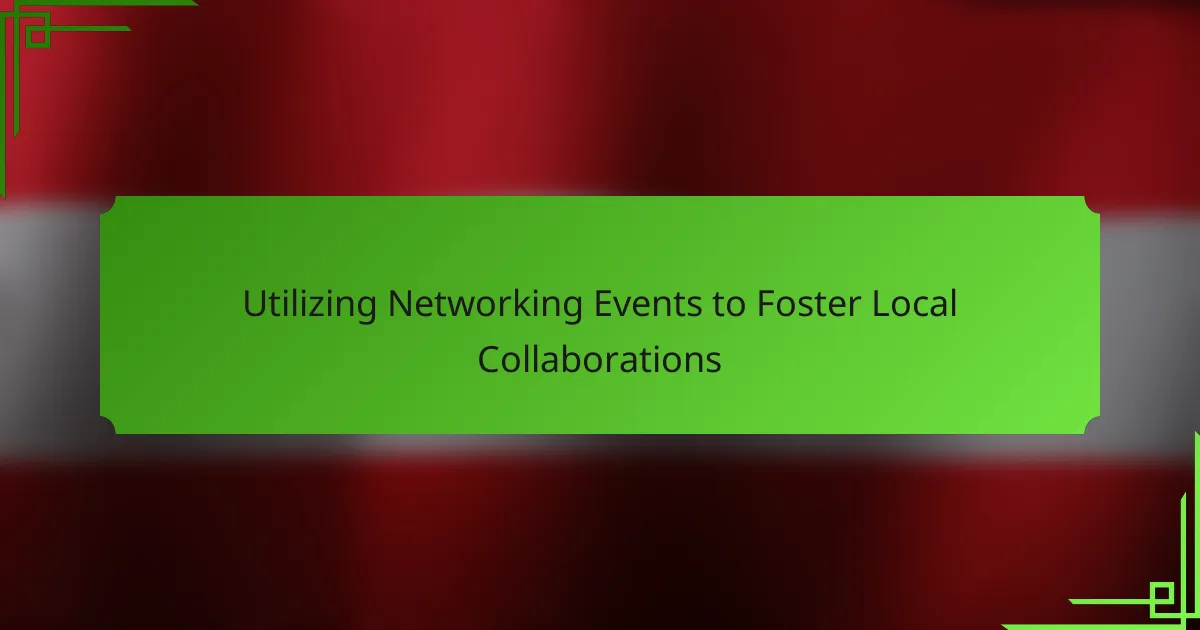Networking events serve as vital platforms for fostering local collaborations by enabling individuals and businesses to connect and share ideas. These gatherings not only cultivate relationships but also pave the way for productive partnerships that can enhance the local economy. By selecting the right events that align with your professional goals, you can effectively engage with like-minded individuals and explore mutually beneficial opportunities.
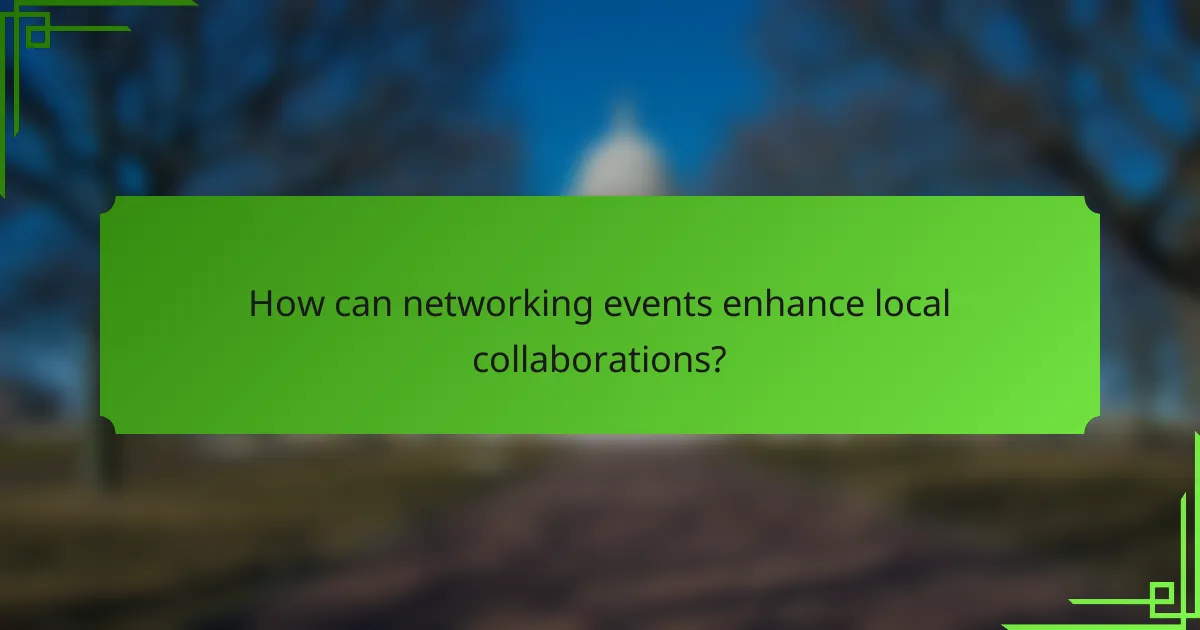
How can networking events enhance local collaborations?
Networking events can significantly enhance local collaborations by providing a platform for individuals and businesses to connect, share ideas, and explore mutual interests. These gatherings foster relationships that can lead to productive partnerships and resource sharing, ultimately benefiting the local economy.
Increased visibility for local businesses
Networking events allow local businesses to showcase their products and services to a broader audience. By participating, businesses can gain exposure to potential customers, partners, and investors, which can lead to increased sales and brand recognition.
To maximize visibility, businesses should prepare marketing materials, such as brochures or business cards, and consider offering samples or demonstrations. Engaging with attendees through social media during the event can also enhance reach and engagement.
Opportunities for partnerships and joint ventures
Networking events create a fertile ground for discovering partnership opportunities and joint ventures. By meeting other local entrepreneurs and organizations, businesses can identify complementary strengths and explore collaborative projects that can drive growth.
When seeking partnerships, it’s essential to approach potential collaborators with clear objectives and a mutual benefit in mind. Consider setting up follow-up meetings to discuss ideas in detail and develop a formal agreement if both parties are interested.
Access to diverse skill sets and resources
Attending networking events provides access to a variety of skill sets and resources that may not be available within a single organization. Local professionals often bring unique expertise that can enhance projects and initiatives.
To leverage this diversity, businesses should actively seek out individuals with skills that complement their own. Creating informal groups or committees to share knowledge and resources can also be beneficial for ongoing collaboration.
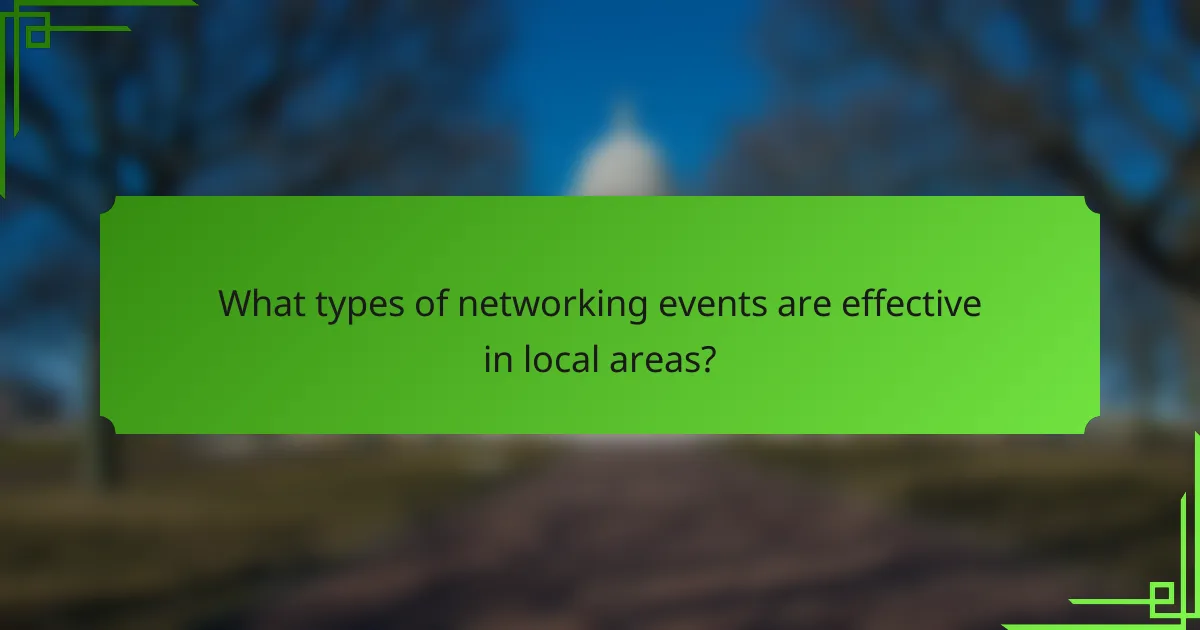
What types of networking events are effective in local areas?
Effective networking events in local areas include industry-specific conferences, community meetups, workshops, and Chamber of Commerce events. These gatherings facilitate connections among professionals and foster collaborations that can benefit local economies and industries.
Industry-specific conferences
Industry-specific conferences are gatherings focused on particular sectors, such as technology, healthcare, or finance. These events often feature keynote speakers, panel discussions, and networking sessions that allow participants to engage with thought leaders and peers.
When attending, consider preparing an elevator pitch and having business cards ready. Engaging in discussions about current trends can help you stand out and make meaningful connections.
Community meetups and workshops
Community meetups and workshops are informal gatherings that encourage local professionals to share knowledge and skills. These events can range from casual coffee meetups to structured workshops on specific topics, such as digital marketing or coding.
Participating in these events can enhance your local network and provide opportunities for collaboration on projects. Look for meetups on platforms like Meetup.com or local community boards to find relevant gatherings.
Chamber of Commerce events
Chamber of Commerce events are organized by local chambers to promote business development and networking among members. These events often include luncheons, mixers, and business expos, providing a platform for local businesses to connect and collaborate.
Joining your local Chamber of Commerce can offer access to exclusive events and resources. Be proactive in attending these gatherings and consider volunteering to increase your visibility within the community.
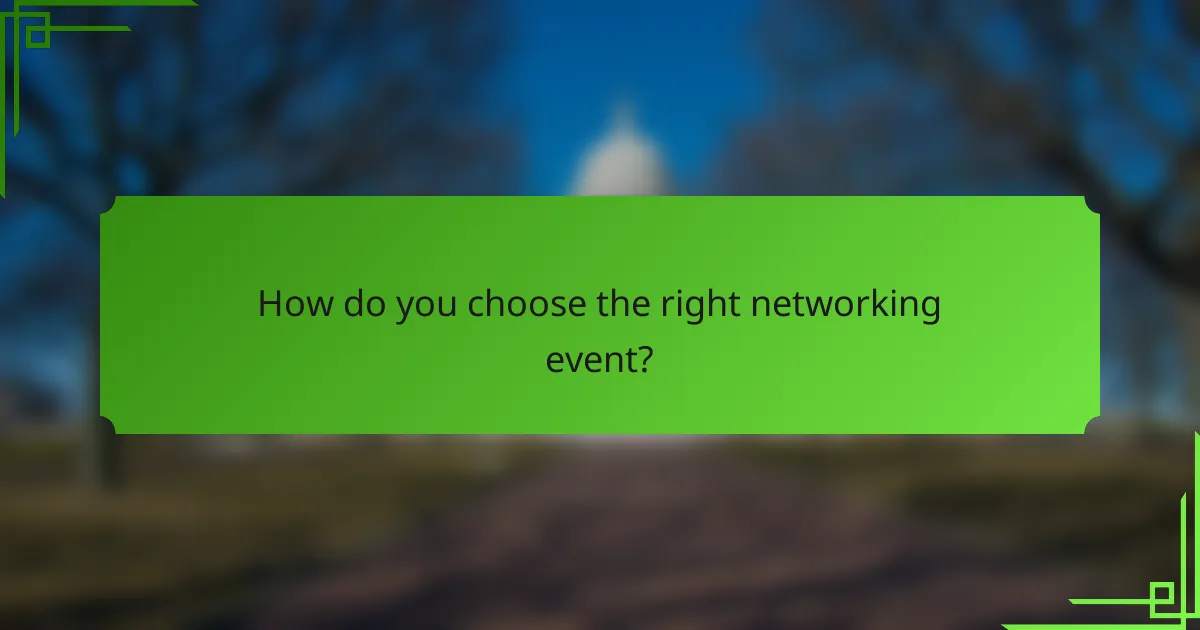
How do you choose the right networking event?
Choosing the right networking event involves identifying your objectives and the audience you want to connect with. Focus on events that align with your professional goals and offer opportunities to meet individuals who can help you achieve them.
Identify target audience and goals
Start by clarifying your networking goals. Are you looking to find potential clients, partners, or mentors? Understanding your objectives will help you select events that attract the right people.
Next, consider the demographics of the attendees. Look for events that cater to your industry or niche, as these will likely have participants who share similar interests and professional backgrounds.
Evaluate event format and size
The format of the event can significantly impact your networking experience. Smaller, more intimate gatherings often allow for deeper conversations, while larger conferences may provide a broader range of contacts.
Consider whether the event includes structured activities, such as workshops or panel discussions, which can facilitate interactions. Aim for events that balance size and format to suit your networking style.
Research event organizers and speakers
Investigate the credibility of the event organizers and the profiles of the speakers. Established organizers with a good reputation are more likely to attract quality attendees and provide a valuable experience.
Look for speakers who are recognized in your field, as they can draw in relevant participants. Engaging with speakers and attendees during the event can lead to meaningful connections and collaborations.
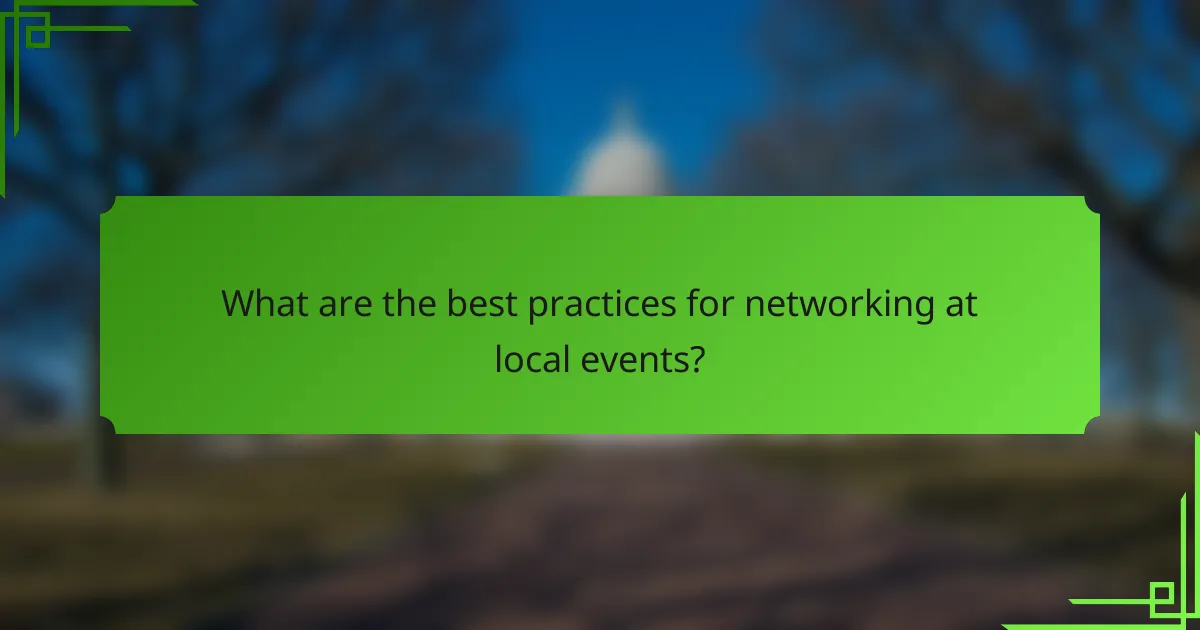
What are the best practices for networking at local events?
Effective networking at local events involves preparation, active engagement, and timely follow-up. By employing these best practices, you can build meaningful connections that foster collaborations within your community.
Prepare an elevator pitch
An elevator pitch is a concise summary of who you are and what you do, ideally lasting about 30 seconds. This brief introduction should clearly communicate your professional background and what you hope to achieve through networking.
To craft a compelling elevator pitch, focus on your unique value proposition. For example, if you are a graphic designer, mention your specialization and a notable project that showcases your skills. Tailor your pitch to resonate with the audience at the event.
Follow up with connections
Following up after a networking event is crucial for maintaining the relationships you’ve initiated. Aim to reach out within a few days, using email or social media to remind them of your conversation and express your interest in staying connected.
In your follow-up, personalize your message by referencing specific topics discussed during your interaction. This not only reinforces your connection but also demonstrates genuine interest in their work. Consider scheduling a coffee meeting or a virtual chat to explore potential collaborations further.
Engage actively in discussions
Active engagement in discussions at networking events can significantly enhance your visibility and rapport with others. Listen attentively, ask open-ended questions, and contribute thoughtfully to conversations to demonstrate your interest and expertise.
To make the most of these discussions, be prepared with relevant insights or experiences that relate to the topics being discussed. This can help you stand out and position yourself as a knowledgeable resource within your local network.
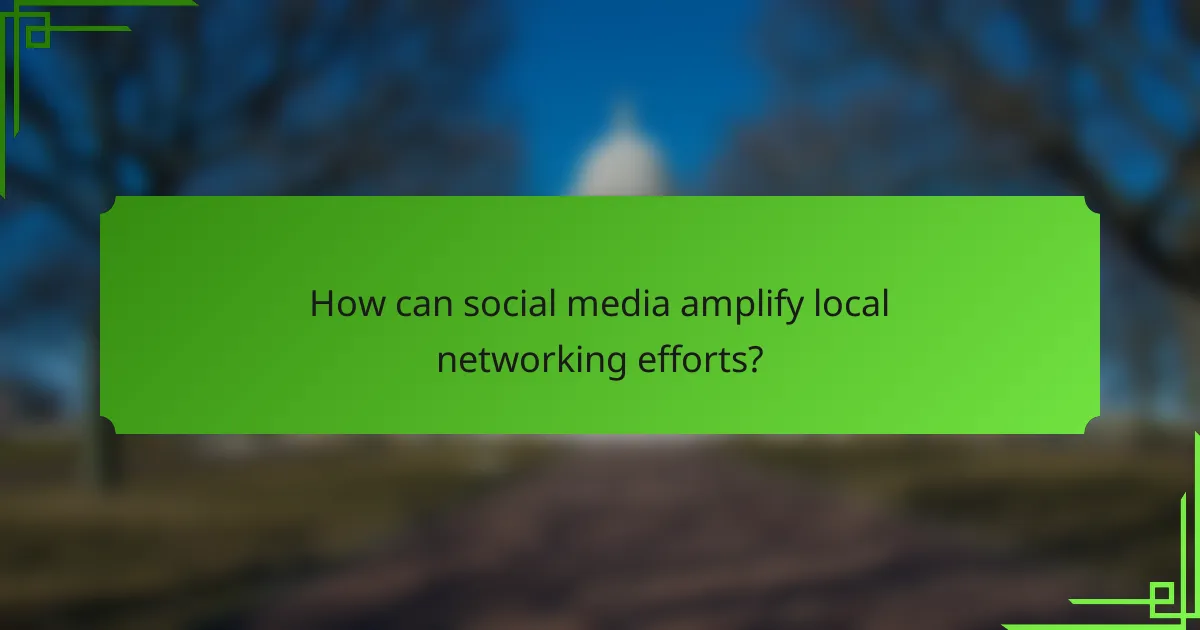
How can social media amplify local networking efforts?
Social media can significantly enhance local networking by providing platforms for event promotion, sharing experiences, and facilitating connections. By leveraging these tools, individuals and organizations can reach a broader audience and foster collaborations within their communities.
Promote events through local groups
Utilizing local groups on social media is an effective way to promote networking events. Platforms like Facebook and Meetup allow users to create events and invite members within specific geographical areas, ensuring that the right audience is reached.
Consider joining local business groups or community forums where you can share event details. Engaging with these groups can lead to higher attendance and more meaningful connections.
Share insights and experiences online
Sharing insights and experiences from networking events on social media can inspire others to participate. Posting photos, key takeaways, or even live updates during the event can create buzz and encourage local engagement.
Use relevant hashtags to increase visibility and connect with others who share similar interests. This not only showcases your involvement but also builds a community around shared experiences.
Utilize platforms like LinkedIn for connections
LinkedIn is a powerful tool for professional networking, particularly for local collaborations. After attending events, connect with fellow attendees on LinkedIn to maintain relationships and expand your network.
Personalize connection requests by mentioning the event or a specific conversation you had. This approach increases the likelihood of acceptance and lays the groundwork for future collaborations.
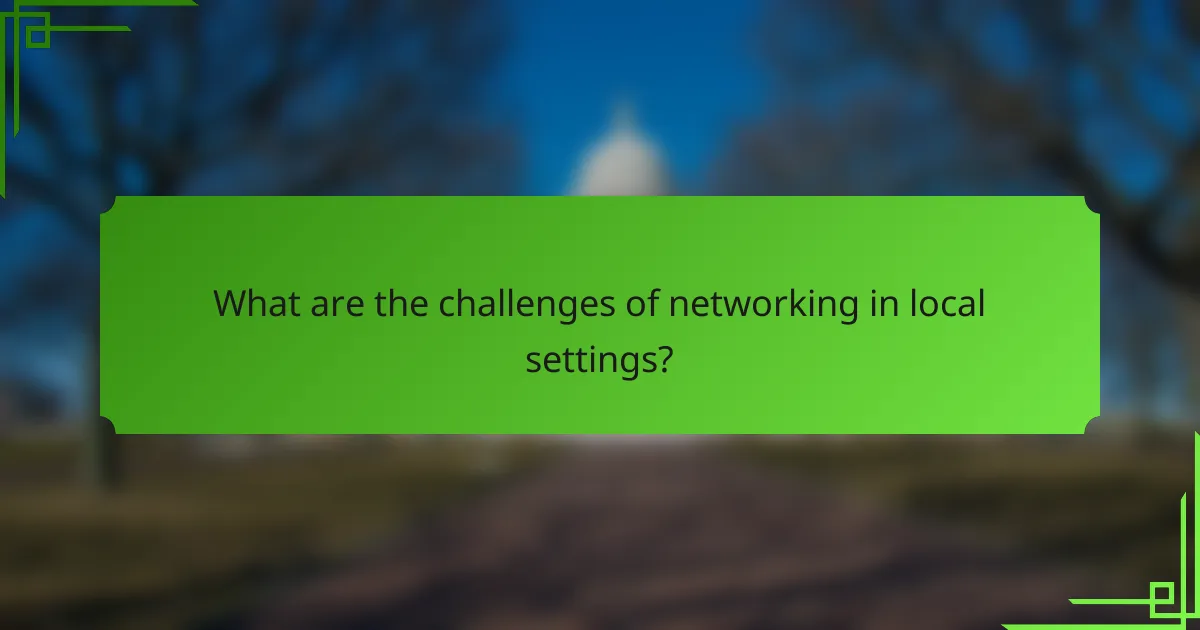
What are the challenges of networking in local settings?
Networking in local settings presents several challenges, including limited access to diverse contacts, varying levels of engagement, and potential cultural barriers. These factors can hinder effective collaboration and relationship-building among local professionals.
Limited access to diverse contacts
Local networking events often attract a similar group of individuals, which can restrict exposure to new ideas and perspectives. This homogeneity can lead to missed opportunities for collaboration with professionals from different industries or backgrounds.
To overcome this challenge, consider attending events that focus on specific themes or industries outside your usual scope. Engaging in community activities or volunteering can also introduce you to a wider range of contacts.
Varying levels of engagement
Not all attendees at networking events are equally motivated to connect or collaborate. Some may be there for casual conversation rather than serious networking, which can lead to frustration for those seeking meaningful connections.
To navigate this, approach networking with clear goals in mind. Identify key individuals you want to connect with and prepare specific questions or topics to discuss, ensuring that your interactions are purposeful.
Cultural barriers
Cultural differences can create misunderstandings in communication styles and expectations during networking events. This can be particularly pronounced in diverse communities where attendees come from various backgrounds.
To mitigate cultural barriers, take the time to learn about the local culture and communication norms. Being respectful and adaptable can help foster a more inclusive environment and facilitate better connections.
